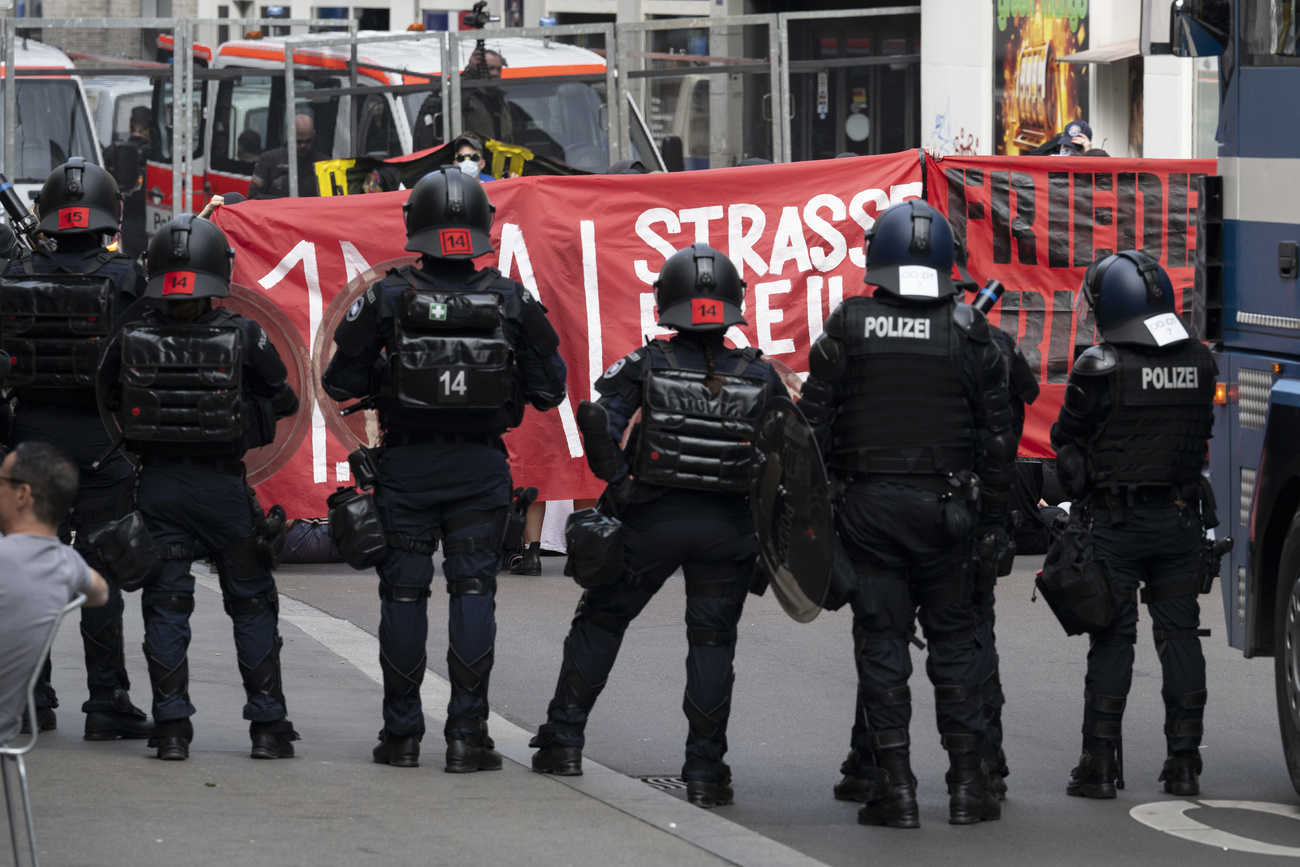Protests mark “end of Tunisian economic miracle”

Violent protests in Tunisia mark the end of an informal pact imposed by the regime – prosperity versus limited freedom – says Swiss Arab expert Hasni Abidi.
Thousands of lawyers went on strike in Tunisia on Thursday, a week after a police crackdown on protests against unemployment. A Tunisian graduate whose suicide attempt last month set off the initial protests died on Wednesday.
Mohammed Bouazizi, 26, set himself on fire in front of a government building in the central town of Sidi Bouzid, saying he was driven to the act after police confiscated his fruit and vegetable cart because he did not have the necessary permit.
Trade unionists said more strikes, protests, even attempted suicides took place in other parts of Tunisia on Thursday. Demonstrations against the Tunisian government were reported in Geneva (100 people), Lausanne (15), Paris (200) and Montreal (60).
swissinfo.ch: What is the nature of this protest movement?
Hasni Abidi: The scale of the protests is unprecedented in Tunisia’s recent history. And as students return to school and university it seems to be spreading. The regime’s biggest fear was to see schoolchildren and university students getting involved in the protests – and this is now happening.
Today there is a spiralling of protests and rebellions not just in the town of Sidi Bouzid where the protests started, but in other cities and among other groups of people.
swissinfo.ch: Has the protest movement wider support in Tunisia?
H.A.: The young jobless man who set fire to himself has become a symbol of general discontent. The young people demonstrating today are showing the government and other Tunisians that President Zine al-Abidine Ben Ali’s regime – viewed as stable and secure – is not invincible. With their bare hands these young people are making a breach in the regime’s police forces, which are seen as ruthless.
This is unique. The Tunisians are no longer afraid of this police state. But there is one major uncertainty – the capital, Tunis. If things start happening there and we see street protests, the regime will face a very serious challenge to its authority.
swissinfo.ch: In the past the Tunisian regime has suppressed all forms of organised opposition. Are these protests likely to last?
H.A.: The government has complete control over the media and the political scene. The Tunisian parliament has become a place that simply rubberstamps decisions. The regime has blocked citizens from access to all forms of support or expression, effectively silencing them.
The recent protests do not have a political agenda, neither are they backed by any real leaders. This is dangerous for the authorities as they don’t have anyone with whom they can meet and discuss.
The ageing regime, which is divided even within the Ben Ali clan, is losing touch with Tunisian society. It can no longer simply make cosmetic changes, as it has done in the past.
swissinfo.ch: For a long time Tunisia has emphasised its economic development to make its limited freedoms more acceptable. Is this the end of the road for this model?
H.A.: These protests mark the end of the “Tunisian economic miracle”; for years the country has been presented as a brilliant IMF student and received considerable support from many European heads of state.
The protests, which are essentially on economic and social grounds, highlight the fact that Tunisia’s development has only benefited a small number of people in power or its inner circles. That’s why people are fed up right now.
Economic and social rights are closely linked to political rights. In all the recent protests there have been demands for more freedom, democracy and transparency.
swissinfo.ch: What are the immediate consequences for the Tunisian regime?
H.A.: It all depends on how the authorities manage the revolt and how far the movement spreads, especially to Tunis. Another question is whether the president intends to stand again in 2013.
This protest movement is creating bigger divisions within the regime. It’s likely that inside, certain factions will try to take advantage of these demonstrations to score some points against their rivals.
But it is also possible that the regime calls them terrorist threats to distract and snuff out the protest movement – a classic ploy by governments in the region.
Hasni Abidi is a political scientist and specialist of the Arab-speaking world.
He is director of the Geneva-based Study and Research Center for the Arab and Mediterranean World, which was established in September 2000.
His work focuses on political developments in the Middle East and North Africa; he has published numerous works and articles.
The recent strikes by lawyers came amid growing unrest following the death of an unemployed 26-year-old university graduate, Mohammed Bouazizi, who set himself alight on December 17 in front of a government building in the central town of Sidi Bouzid.
Bouazizi said he was driven to the act by police who had seized his fruit and vegetable cart over a permit. He died on Tuesday of his burns.
His act was embraced by students, professionals and young people who are angry at a shortage of jobs and restrictions on public freedoms.
Protests have grown into the most widespread and violent flare-up of popular dissent in President Zine al-Abidine Ben Ali’s 23-year rule.
Anti-riot police deployed in the main arteries and around some mosques of Algiers ahead of Friday prayers after street riots this week over food price rises and the lack of job opportunities.
Hundreds of youths clashed with police in several Algerian cities earlier in the week, and ransacked stores in the capital.
The rioting came after price hikes for milk, sugar and flour in recent days, and amid simmering frustration that Algeria’s abundant gas-and-oil resources have not translated into broader prosperity.
(Adapted from French by Simon Bradley)

In compliance with the JTI standards
More: SWI swissinfo.ch certified by the Journalism Trust Initiative












You can find an overview of ongoing debates with our journalists here . Please join us!
If you want to start a conversation about a topic raised in this article or want to report factual errors, email us at english@swissinfo.ch.